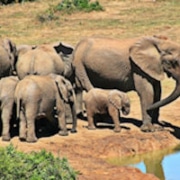How Eco Tourism Has Saved the Mountain Gorillas in Rwanda
How Eco Tourism Has Saved the Mountain Gorillas in Rwanda
According to the 2011 gorilla census, there are only 880 Mountain Gorillas left in the wild worldwide. Making it a critically endangered species of ape. Half of this population is found in Bwindi Impenetrable National Park in south western Uganda. The other half is found in the magnificent Virunga Mountain ranges. These are shared by Rwanda (Volcanoes National Park), Uganda (Mgahinga National Park) and Democratic Republic of Congo (Virunga National Park).
The mountain gorillas are endangered and at risk of extinction. There are many International and regional bodies working hard to protect the gorillas and their habitat. These include the International Gorilla Conservation Programme (IGCP), Dian Fossey Gorilla Fund International, Rwanda Development Board and Gorilla Doctors, among others.
Man is the main threat to the mountain gorilla population in Africa. This threat is through activities of poaching and encroachment to their habitat. Therefore, Eco tourism is the way forward towards the protection of the mountain gorillas in Rwanda through the following ways;
In the first instance, Volcanoes National park Rwanda today has 10 habituated gorilla groups available for ecotourism purposes. Mountain Gorilla trekking is the main tourist activity in the park. A maximum of 8 persons are allowed to visit each gorilla group per day. And tourists are only allowed to stay with the gorillas for a maximum of one hour. Man is a visitor in small groups for a short period of time. This promotes responsible travel and protects the gorillas and their natural setting.
Additionally, gorilla trekking rules have been put in place and clients are briefed before starting the trek. The rules aim at protecting the mountain gorillas and their habitat. These rules include;
- Not to litter in the gorilla habitat
- Not to make noise in the forest
- Not to smoke, drink or eat near gorillas
- No taking pictures with flash cameras
- Keep distance of 7 meters from the gorillas
- Not to touch the gorillas
- Dig a hole in case you want to ease yourself and bury it after
- Cover your mouth when coughing to avoid transmitting diseases to the gorillas.
- If a person has flu or cough, they are not allowed to go gorilla trekking
Other tourist activities in Volcanoes National Park Rwanda include golden monkey tracking, adventurous hikes to Dian Fossey tombs and Iby’Iwacu cultural village tour. The latter is where tourists learn about the ways of life of the local people. Tourists also learn about their cultures and actively participate in local music, dance and drama.
Iby’Iwacu cultural village’s main object is to demonstrate the ways of life of Rwandese to tourists. The Rwandese earn a living from their activities. Through goats for gorilla project, tourists to Iby’wacu cultural village donate US $25-50 to purchase a goat for an ex-poacher’s families, thus saving the gorillas in Rwanda.
Many Eco-lodges and resorts have been constructed around Volcanoes National Park for nature lovers. Such lodges are constructed from local/natural materials such as volcanic stones, bamboo and wood to blend with the environment. Such Eco-lodges include Virunga Lodge, Mountain Gorilla View Lodge, Le Bambou Gorilla Lodge and Sabyinyo Silverback Lodge among others.
Through Eco-tourism around Volcanoes National Park, the local communities are sensitized about the value of gorilla tourism, and they directly benefit from gorilla tourism revenues. For example, during this year’s Kwita Izina (Gorilla Naming ceremony in Rwanda), Rwanda Development Board and Dian Fossey Gorilla Fund launched 12 classrooms at Gatebe Primary school. During the 2015 Kwita Izina ceremony, Bisate Learning centre in Musanze was launched and today has over 2300 students. Many other schools get support from eco-tourism revenues around the park. Additionally, the local communities are rewarded with medical centers and piped water from gorilla tourism revenues.
Furthermore, ex poachers have been employed in different sectors of tourism such as eco-lodges and in the park. Most porters and park rangers were ex-poachers, now fighting poaching and saving the Mountain Gorillas. Because they now benefit from the gorillas, they can no-longer go back to poaching, thus saving the mountain gorillas in Volcanoes National Park Rwanda.
This post was submitted by Paul Basudde, who works with African Jungle Adventures in Rwanda and Uganda.






